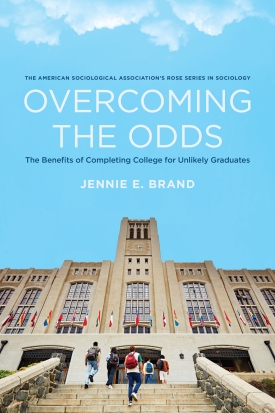
Overcoming the Odds
About This Book
A Volume in the American Sociological Association’s Rose Series in Sociology
"With the latest surge in critics questioning the value of college degrees, Overcoming the Odds couldn’t come at a better time. Jennie E. Brand’s book considers the transformative effects of college from a holistic perspective—not just the earnings premium but all the nonpecuniary benefits of earning a degree. Her research is an important contribution to the conversation: yes, a college degree is ‘worth it,’ both for the individual and society at large."
—ANTHONY P. CARNEVALE, research professor and director, Center on Education and the Workforce (CEW), McCourt School of Public Policy, Georgetown University
"In Overcoming the Odds Jennie E. Brand solves one of the great social science puzzles of our time: Would young people who are unlikely to graduate from college get anything out of it if they were lucky enough to get a degree? Brand applied advances in modern statistical inference to arrive at the answer, and it is YES! She illustrates her conclusions with real case studies that reveal the lived experiences behind the statistics."
—MICHAEL HOUT, professor of sociology, New York University
Each year, millions of high school students consider whether to continue their schooling and attend and complete college. Despite strong evidence that a college degree yields far-reaching benefits, some critics of higher education increasingly argue that college “does not pay off” and that some students—namely, disadvantaged prospective college students—would be better served by forgoing higher education to immediately enter the workforce or pursue vocational training instead. But debates about the value of college often fail to consider what each individual’s life would look like had they not completed college, or what is known as a person’s college counterfactual. In Overcoming the Odds sociologist Jennie E. Brand reveals the benefits of completing college by comparing life outcomes of college graduates with their college counterfactuals.
Drawing on two cohorts of nationally representative data from the Bureau of Labor Statistics National Longitudinal Surveys program, Brand uses matching and machine learning methods to estimate the effects of college completion across students with varying likelihoods of completing four-year degrees. To illustrate her findings, Brand describes outcomes using matched vignettes of college and noncollege graduates. Brand shows that four-year college completion enables graduates to increase wages and household income, while also circumventing unemployment, low-wage work, job instability, poverty, and social assistance. Completing college also increases civic engagement. Most of these benefits are larger for disadvantaged than for more advantaged students, rendering arguments that college has limited benefits for unlikely graduates as flawed. Brand concludes that greater long-term earnings, and less job instability and unemployment, and thus more tax revenue, less reliance on public assistance, and high levels of volunteering indicate that public investment in higher education for students from disadvantaged backgrounds yields far-reaching collective benefits.
Overcoming the Odds is an innovative and enlightening exploration of how college can transform lives. Brand’s novel research convincingly demonstrates that it is better for our society when more people complete college.
JENNIE E. BRAND is professor of sociology and statistics, University of California, Los Angeles.
